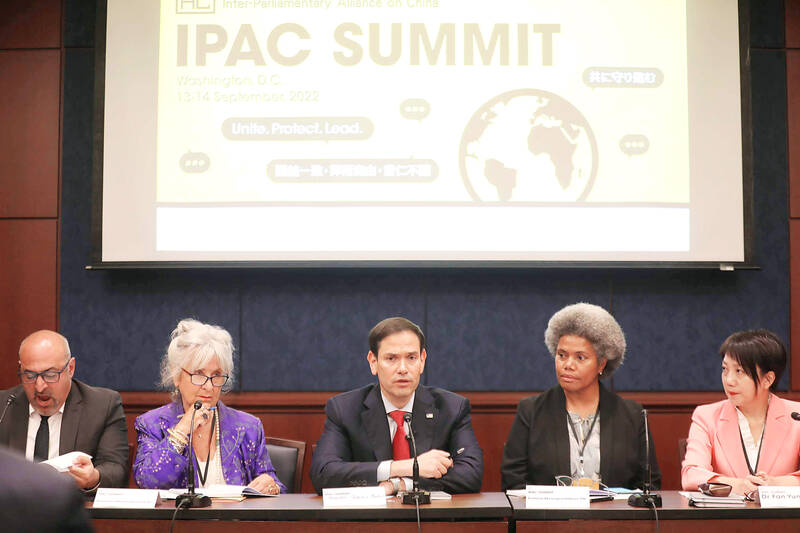The “status quo” across the Taiwan Strait must not be changed unilaterally, the Inter-Parliamentary Alliance on China (IPAC) said on Wednesday at the conclusion of its annual meeting in Washington, expressing support for Taiwan.
The communique declared that IPAC would continue to jointly defend peace and stability in the Taiwan Strait, as well as Taiwan’s economic and trade security, through the legislative bodies of its member countries.
More than 60 parliamentarians from different countries attended this year’s meeting and passed the communique without objection at its conclusion.

Photo: CNA
The meeting also included a session on strengthening democratic support for Taiwan, which was attended by Democratic Progressive Party Legislator Fan Yun (范雲), New Power Party Legislator Claire Wang (王婉諭) and independent Legislator Freddy Lim (林昶佐).
“If, in fact, the Chinese Communist Party is successful in subjecting the people of Taiwan to living under tyranny, it will be a moment that will steer the course of human events for generations,” US Senator Marco Rubio, an IPAC cochair, said during the meeting.
The communique also discussed human rights, defense of the rules-based global order, the political situation in Hong Kong, the strengthening of democracy worldwide and support for Ukraine.
The communique condemned China’s military exercises near Taiwan and its coercive military threats. It called on countries worldwide to oppose China’s tactics in the Strait, to promote state visits to Taiwan and upgrade the status of the country’s missions abroad.
It also called for Taiwan’s meaningful participation in the WHO, the International Civil Aviation Organization, Interpol, the UN Framework Convention on Climate Change, and other international covenants and organizations.
The communique also called on governments of all countries to convey to China that military aggression against Taiwan would come at a heavy price, and to consider substantive sanctions in response to military escalation by China.
Countries should make good use of intergovernmental mechanisms to curb economic coercion by China, and to ensure continued relations with Taiwan, it said.
The Ministry of Foreign Affairs yesterday in a statement said that Taiwan would continue to work with IPAC and other like-minded international partners to jointly maintain peace and stability in the Indo-Pacific region, and to defend the core values shared by global democracies.
IPAC is an international cross-party group of legislators working to develop policies that democratic countries can follow in their approach to China, according to the alliance’s Web site.
Its current members include cross-party legislators from the European Parliament, the US, the UK, France, Germany, the Czech Republic, Italy, Australia, Belgium, Canada, India, Italy, Japan, Lithuania and Ukraine, among others.

AIR SUPPORT: The Ministry of National Defense thanked the US for the delivery, adding that it was an indicator of the White House’s commitment to the Taiwan Relations Act Deputy Minister of National Defense Po Horng-huei (柏鴻輝) and Representative to the US Alexander Yui on Friday attended a delivery ceremony for the first of Taiwan’s long-awaited 66 F-16C/D Block 70 jets at a Lockheed Martin Corp factory in Greenville, South Carolina. “We are so proud to be the global home of the F-16 and to support Taiwan’s air defense capabilities,” US Representative William Timmons wrote on X, alongside a photograph of Taiwanese and US officials at the event. The F-16C/D Block 70 jets Taiwan ordered have the same capabilities as aircraft that had been upgraded to F-16Vs. The batch of Lockheed Martin

GRIDLOCK: The National Fire Agency’s Special Search and Rescue team is on standby to travel to the countries to help out with the rescue effort A powerful earthquake rocked Myanmar and neighboring Thailand yesterday, killing at least three people in Bangkok and burying dozens when a high-rise building under construction collapsed. Footage shared on social media from Myanmar’s second-largest city showed widespread destruction, raising fears that many were trapped under the rubble or killed. The magnitude 7.7 earthquake, with an epicenter near Mandalay in Myanmar, struck at midday and was followed by a strong magnitude 6.4 aftershock. The extent of death, injury and destruction — especially in Myanmar, which is embroiled in a civil war and where information is tightly controlled at the best of times —

China's military today said it began joint army, navy and rocket force exercises around Taiwan to "serve as a stern warning and powerful deterrent against Taiwanese independence," calling President William Lai (賴清德) a "parasite." The exercises come after Lai called Beijing a "foreign hostile force" last month. More than 10 Chinese military ships approached close to Taiwan's 24 nautical mile (44.4km) contiguous zone this morning and Taiwan sent its own warships to respond, two senior Taiwanese officials said. Taiwan has not yet detected any live fire by the Chinese military so far, one of the officials said. The drills took place after US Secretary

THUGGISH BEHAVIOR: Encouraging people to report independence supporters is another intimidation tactic that threatens cross-strait peace, the state department said China setting up an online system for reporting “Taiwanese independence” advocates is an “irresponsible and reprehensible” act, a US government spokesperson said on Friday. “China’s call for private individuals to report on alleged ‘persecution or suppression’ by supposed ‘Taiwan independence henchmen and accomplices’ is irresponsible and reprehensible,” an unnamed US Department of State spokesperson told the Central News Agency in an e-mail. The move is part of Beijing’s “intimidation campaign” against Taiwan and its supporters, and is “threatening free speech around the world, destabilizing the Indo-Pacific region, and deliberately eroding the cross-strait status quo,” the spokesperson said. The Chinese Communist Party’s “threats